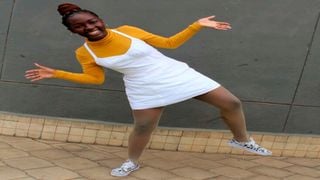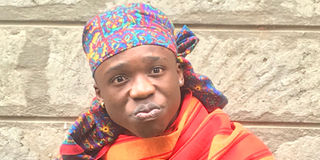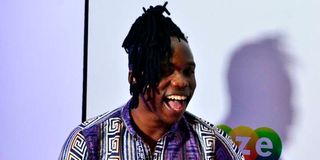
Elsa Majimbo, a Kenyan comedienne.
| Pool | Nation media GroupCulture
Premium
How Covid-19 changed Kenya’s comedy scene, and led to new crop of stars
What you need to know:
- With the evolution from Churchill Show to TikTok, digital comedy could be the best thing to ever happen to performers.
- Since Covid-19 is still with us, it is clear that comedians will now have to reinvent themselves.
- Comedian Elsa Majimbo is a prime example of what tech-savvy, talented comedians can achieve using social media.
Almost all comedians will tell you that the last one year has not been good for them. You see, the industry, like all others, has suffered numerous setbacks, changing its outlook. Ambition and passion have now been replaced with depression and despair.
Stand-up comedians – a majority in Kenya – have been hit hardest. The ban on social gatherings resulted in loss of revenue for the performers, who depended on gigs like the “Churchill Show” and MCing jobs.
But for others the lockdown and shift to online entertainment was an opportunity to shine. Comedian Elsa Majimbo rose to fame in March 2020 when she posted a video of herself noisily munching on snacks and declaring she didn't, in fact, miss anyone.
Her online videos became a sensation as the world embraced digital social apps for entertainment and to help keep in touch with friends and family and follow the news. In the blink of an eye, Majimbo rose from just being the girl next door to a celebrity with international recognition. This signalled a change in how comedy would be consumed by fans.

Singer, dancer, comedian and scriptwriter Erastus Ayieko Otieno aka Flaqo 411, in his famed character Mama Otis.
Another comedian who instantly shot to stardom thanks to the digital shift is Erastus Otieno, popularly known by his stage names Mama Otis and Flaqo.
Flaqo said he conceptualised the idea of playing the role of a typical Kenyan mother with a no-nonsense attitude while still in university, where he used to create and share videos with his friends via WhatsApp.
But it is in 2020 that his brand grew in popularity.

Erastus Otieno, also known as Flaqo, poses for a photo during the launch of Baze at Michael Joseph Center on May 27, 2021.
“I’m not a stand-up comedian and cannot stand on stage and try to make people laugh. I would fail terribly,” said Flaqo in a recent interview.
“Stand-up comedians now have to reinvent themselves in creating content for their online audience. This is a big challenge for most of them. I guess that has really built bitterness in people.”
Reinvention, club comedy

Comedian Eddie Butita.
And with Covid-19 still with us, it is clear that comedians will now have to reinvent themselves.
“The ‘Churchill Show’ came on around 2008. Before that, stand-up comedy was not a thing. We thought of comedy to be the programmes we saw on TV, for example, ‘Vitimbi’ with the likes of Mzee Ojwang and Mama Kayai,” says comedian Eddie Butita.
“That is the comedy we knew until the ‘Churchill Show’ came on and brought out this new perspective of comedy where you can stand on a stage and tell a story in the form of a joke.”
Getting a slot on the show was not easy. Butita says he auditioned about eight times before he was allowed to go on set. “Churchill Show”, however, went off-air for a while, prompting comedians to look for alternative ways of making a living.
Hence the introduction of club comedy.
“The club comedy scene came up and we basically looked for gigs in clubs to perform. We went to clubs like Tribeka and earned like Sh1,000 per show. In a week you might get lucky and have like four gigs, so that is Sh4,000,” explains Butita.
That was the life they knew, because, he says, in Kenya apart from the “Churchill Show” there are few other platforms for comedians.
Luckily, the “Churchill Show” came back on air in 2013 and by that time comedy had grown and many young people had immersed themselves in the industry.
“At this time, there were so many comedians with raw talent that you would end up waiting for almost a month before being able to get a TV slot on the ‘Churchill Show’, which means you are not earning any money,” Butita says.
It is at this point, he says, that a new opportunity presented itself to him - to appear on “The Trend” show on NTV.
Social commentary
This, he says, brought about a new dimension to the comedy scene - social commentary.
A good number of comedians embraced it, including MCA Tricky and Jalango, who took their jokes on-air hosting breakfast shows on radio stations.
“Stand-up comedy is a huge product in the US, where comedians perform for 30 minutes or even one hour, but here in Kenya it is still not a solid product. Comedians in Kenya are surviving on MC jobs, marketing, and not stand-up comedy,” said Butita.
Then came the pandemic.
“Covid-19 brought an angle that was there but was not the primary thing, that is, digital comedy. Some comedians thrived during this time because they were primarily producing digital content, because the audience were now closed up in their homes,” Butita said.
Digital comedy is the best thing to ever happen to performers, because, he says, they have total freedom. They also do not have to depend on someone else to give them a platform. All you need is to own a smartphone.
“We saw a new market that we did not see before and this happened globally. We no longer have to depend on platforms like the ‘Churchill Show’ to show our content, at least that is the reality at the moment,” he said.
“The ‘Churchill Show’ has reinvented itself, because it can no longer have a live audience due to the Covid-19 prevention measures. South African-born, US-based comedian Trevor Noah has also been forced to apply the same on the ‘Daily Show’,” he said.
But there is one challenge to digital comedy - the videos that performers posted attracted companies, turning the entertainers into more of marketers than comedians.
“Concepts like the late-night shows, we have Dr King’ori doing it with his show the ‘Wicked Edition’ and we are yet to see others, because the idea has not yet taken hold in Kenya,” Butita said.
Another revenue stream that comedians can tap into is creative directing and writing jokes for shows.
“I started scripting shows for my colleagues, including Njugush, on his stand-up comedy shows and somehow I did not know that I was building a career for myself as a creative director and script writer. That is how I landed this huge deal with Netflix,” he said.
Netflix, a US streaming entertainment platform, was looking for a creative director and script writer to work on a comedy series that airs on Netflix and create a Swahili version.
“Luckily enough, I was the only one who fit the description, because they wanted someone who had experience directing comedy shows. Comedians now need to be able to blend the live aspect of comedy with digital to be able to survive,” Butita said.





